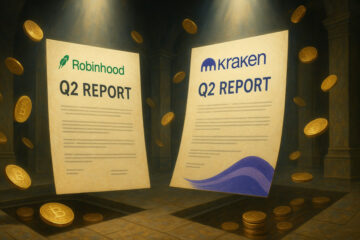Coinbase CEO Brian Armstrong said nearly half of the exchange’s daily code output is now written by artificial intelligence amid a growing reliance on machine-generated development.
In a Sept. 3 post on X, Armstrong revealed that about 40% of code produced at Coinbase already comes from AI tools and predicted that the figure would surpass 50% by October 2025.
However, Armstrong clarified that AI-generated code is not uniformly applied across the exchange, stressing that reviews and human oversight remain critical. He said:
“Obviously it needs to be reviewed and understood, and not all areas of the business can use AI-generated code. But we should be using it responsibly as much as we possibly can.”
Still, this number places the firm ahead of giant technology firms like Microsoft and Google, which have around 30% of their code machine-generated.
His comments followed earlier remarks on the Cheeky Pint Podcast, where he told Stripe co-founder John Collison that Coinbase engineers had been directed to adopt AI development tools within a week.
Armstrong added that employees who resisted the mandate were dismissed, signaling how central AI has become to Coinbase’s engineering strategy.
‘Red flag’
Armstrong’s push quickly drew mixed reactions from the crypto and tech communities. Security specialists voiced concern that handing such a large share of mission-critical code to AI could expose Coinbase to vulnerabilities.
Larry Lyu, founder of Dango decentralized exchange, called the approach “a giant red flag for any security-sensitive business.”


The Crypto Investor Blueprint: A 5-Day Course On Bagholding, Insider Front-Runs, and Missing Alpha
Adam Cochran, partner at venture firm Cinneamhain Ventures, also questioned the wisdom of relying so heavily on AI. He said:
“I’m not sure ‘40% of our code is written by AI’ is what I want to hear from a place that stores financial assets.”
Cochran added that while AI can assist coding, it remains unproven at scale for financial infrastructure.
These industry leaders’ concerns are not unfounded, as reports have revealed that AI codes could produce bugs and “miss relevant context.” This kind of error could be costly for a platform of Coinbase’s size, which holds over $420 billion worth of digital assets on behalf of its users.
However, other industry leaders defended Coinbase’s approach.
Richard Wu, co-founder of Tensor, said critics underestimate the maturity of AI-coding processes.
He argued that 90% of high-quality code could be AI-generated within five years, provided teams maintain rigorous practices such as code reviews, automated testing, and linting.
Wu also compared poor AI outputs to errors from junior engineers, suggesting that structured systems mitigate both.
 Bitcoin
Bitcoin  Ethereum
Ethereum  Tether
Tether  XRP
XRP  Solana
Solana  USDC
USDC  TRON
TRON  Lido Staked Ether
Lido Staked Ether  Dogecoin
Dogecoin  Figure Heloc
Figure Heloc  Cardano
Cardano  Bitcoin Cash
Bitcoin Cash  Wrapped stETH
Wrapped stETH  WhiteBIT Coin
WhiteBIT Coin  Wrapped Bitcoin
Wrapped Bitcoin  Wrapped eETH
Wrapped eETH  USDS
USDS  Chainlink
Chainlink  Binance Bridged USDT (BNB Smart Chain)
Binance Bridged USDT (BNB Smart Chain)  Monero
Monero  LEO Token
LEO Token  WETH
WETH  Stellar
Stellar  Coinbase Wrapped BTC
Coinbase Wrapped BTC  Sui
Sui  Ethena USDe
Ethena USDe  Litecoin
Litecoin  Zcash
Zcash  Avalanche
Avalanche  Hyperliquid
Hyperliquid  Shiba Inu
Shiba Inu  Hedera
Hedera  Canton
Canton  USDT0
USDT0  World Liberty Financial
World Liberty Financial  sUSDS
sUSDS  Dai
Dai  Toncoin
Toncoin  Cronos
Cronos  Ethena Staked USDe
Ethena Staked USDe  PayPal USD
PayPal USD  Polkadot
Polkadot  Uniswap
Uniswap  USD1
USD1  Mantle
Mantle  MemeCore
MemeCore  Rain
Rain  Bittensor
Bittensor 




